.jpg)
If you don’t give up, you still have a chance. Giving up is the greatest failure. ——Jack Ma(2016 World Economic Forum)
“If you don’t give up, you still have a chance. Giving up is the greatest failure.” — 2016 World Economic Forum
.jpg)
“If you don’t give up, you still have a chance. Giving up is the greatest failure.” — 2016 World Economic Forum
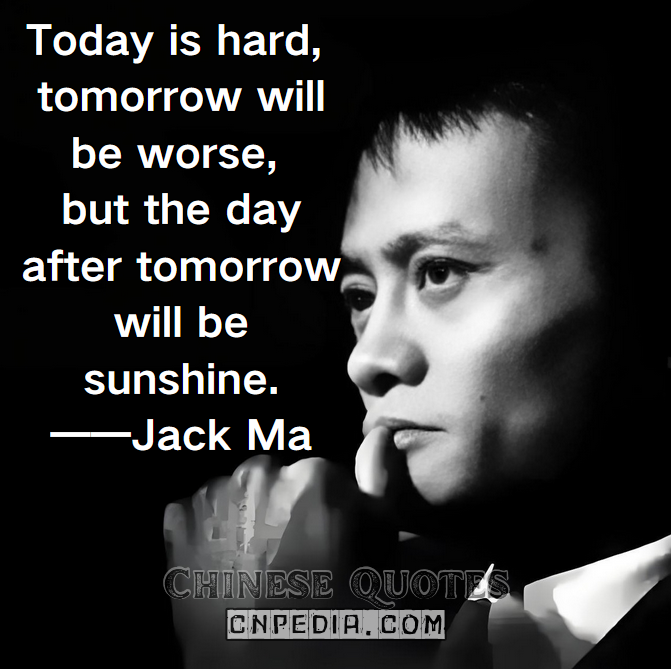
“Today is hard, tomorrow will be worse, but the day after tomorrow will be sunshine.” — 2008 Alibaba Annual Meeting

君子务本,本立而道生。——孔子(jūn zǐ wù běn, běn lì ér dào shēng — Kǒngzǐ) Translation: “Nobles cultivate roots—when roots firm, the Way sprouts.” Explanation: Confucius’ 务本(wù běn) (“cultivate roots”) philosophy frames wisdom as arboreal architecture. First, the character 本(běn) (“root”) modifies 木(mù) (“tree”) with a horizontal stroke (一) marking the root zone—a 3rd-century BCE infographic prioritizing foundational systems over superficial growth. Second, Apple’s vertical integration strategy embodies 本立而道生(běn lì ér dào shēng) (“roots firm, Way sprouts”). By controlling silicon design and OS architecture (本(běn)), Apple ensures ecosystem cohesion (道(dào)), mirroring how ancient scholars grounded ethics in filial piety before expanding into statecraft. Finally, ecological restoration applies this wisdom. Projects like China’s Loess Plateau revival strengthened native plant roots (本(běn)), enabling watershed regeneration (道(dào))....
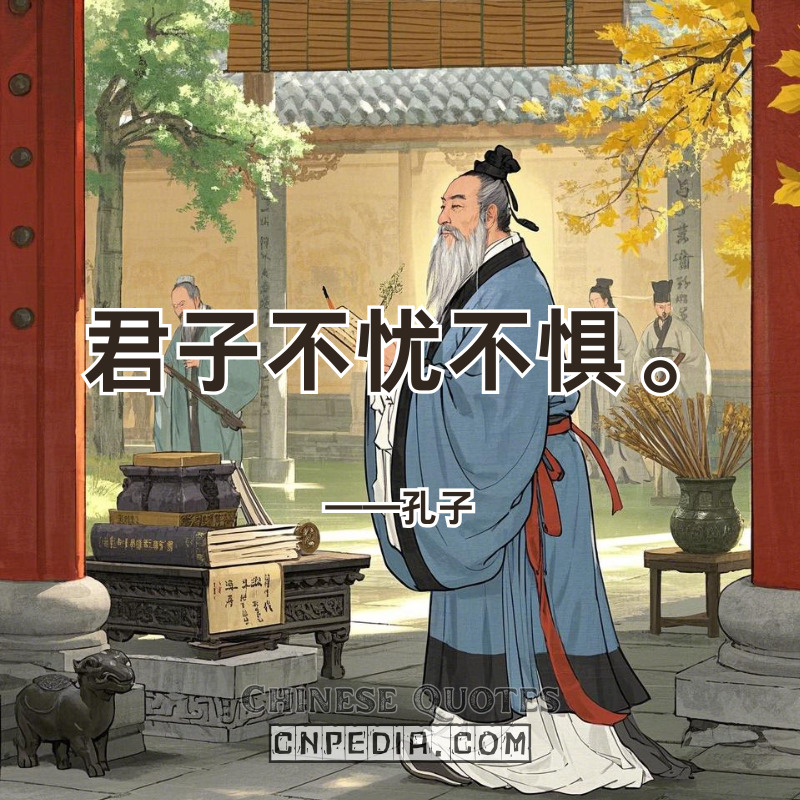
君子不忧不惧。——孔子(jūn zǐ bù yōu bù jù — Kǒngzǐ) Translation: “Nobles neither worry nor fear.” Explanation: Confucius’ maxim 不忧不惧(bù yōu bù jù) redefines courage as emotional sovereignty. First, the character 憂(yōu) (“worry”) combines 心(xīn) (“heart”), 頁(yè) (“head”), and 夊(suī) (“striding legs”)—a Bronze Age depiction of anxiety as a storm raging between mind and body. This contrasts with 懼(jù) (“fear”), whose 心(xīn) radical shows emotion’s physiological roots, anticipating modern psychosomatic research by millennia. Second, cognitive behavioral therapy (CBT) operationalizes this wisdom. By teaching patients to intercept 憂(yōu)-like “automatic negative thoughts,” therapists echo Confucian mental discipline. A 2023 WHO study showed CBT reduced anxiety disorders by 41% in cultures embracing stoic philosophies like 不忧(bù yōu). Third, Navy SEALs’ stress inoculation training embodies 不惧(bù...

人能弘道,非道弘人。——孔子(rén néng hóng dào, fēi dào hóng rén — Kǒngzǐ) Translation: “Humans magnify the Way—the Way doesn’t magnify humans.”Explanation: Confucius’ maxim 人能弘道(rén néng hóng dào) 非道弘人(fēi dào hóng rén) reframes ethics as human-centric praxis. First, the character 弘(hóng) (“to magnify”) structurally resembles hands stretching a bowstring—a metaphor for humanity’s role in tautening abstract principles (道(dào)) into actionable reality. This contrasts with Laozi’s cosmic 道(dào) that “nourishes without claiming,” positioning Confucianism as a call to ethical craftsmanship. Second, this anthropocentric Daoism inspired Sartre’s existentialist maxim “existence precedes essence.” Where Laozi’s 道(dào) flows like water, Confucius’ 弘(hóng) demands human chiseling—akin to sculptors revealing form within marble. Modern startups operationalize this through “founder-market fit”: entrepreneurs like Musk magnify (弘(hóng)) electric vehicle adoption (道(dào))...
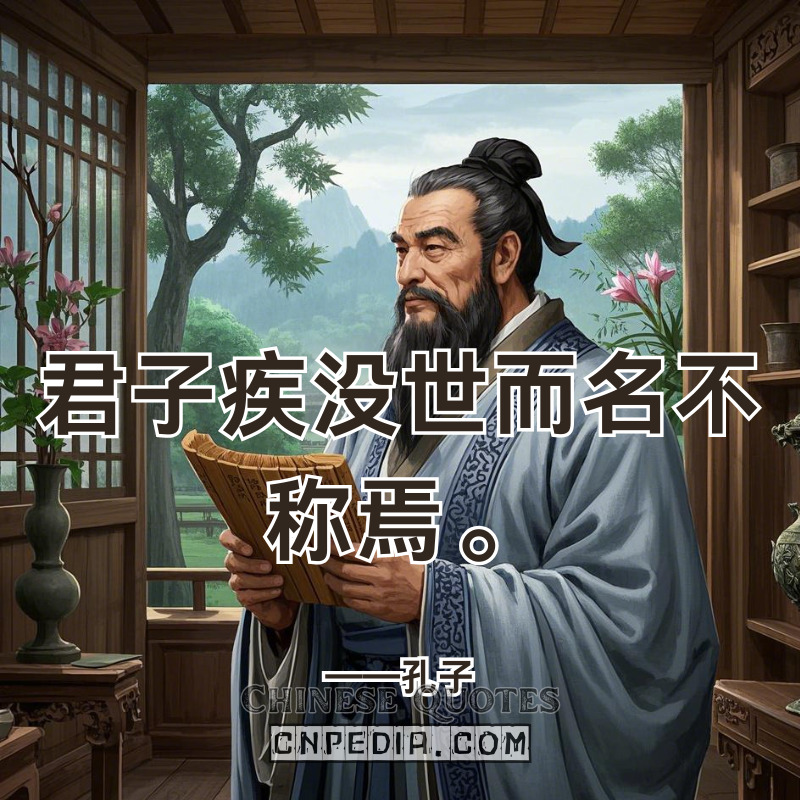
君子疾没世而名不称焉。——孔子(jūn zǐ jí mò shì ér míng bù chèn yān — Kǒngzǐ) Translation: “Nobles dread dying with mismatched reputations.”Explanation: Confucius’ warning 疾没世而名不称(jí mò shì ér míng bù chèn) (“dread dying with mismatched reputations”) establishes legacy as ethical accountability. First, the character 稱/称(chēng) (“to balance repute”) combines 禾(hé) (“grain”) and 爫(zhǎo) (“hand”)—an ancient “reputation scale” pictograph. Just as farmers weigh harvests, nobles must calibrate lifelong deeds against posthumous recognition, a concept now formalized as personal brand audits. Second, this “legacy calibration” drives modern reputation management systems. Platforms like LinkedIn’s “Profile Strength Meter” operationalize 稱(chēng)’s balance metaphor, algorithmically comparing users’ stated skills with endorsements—a digital-age ritual ensuring one’s 名(míng) (“reputation”) aligns with reality. Third, the philosophy underpins emerging digital afterlife services. Startups...
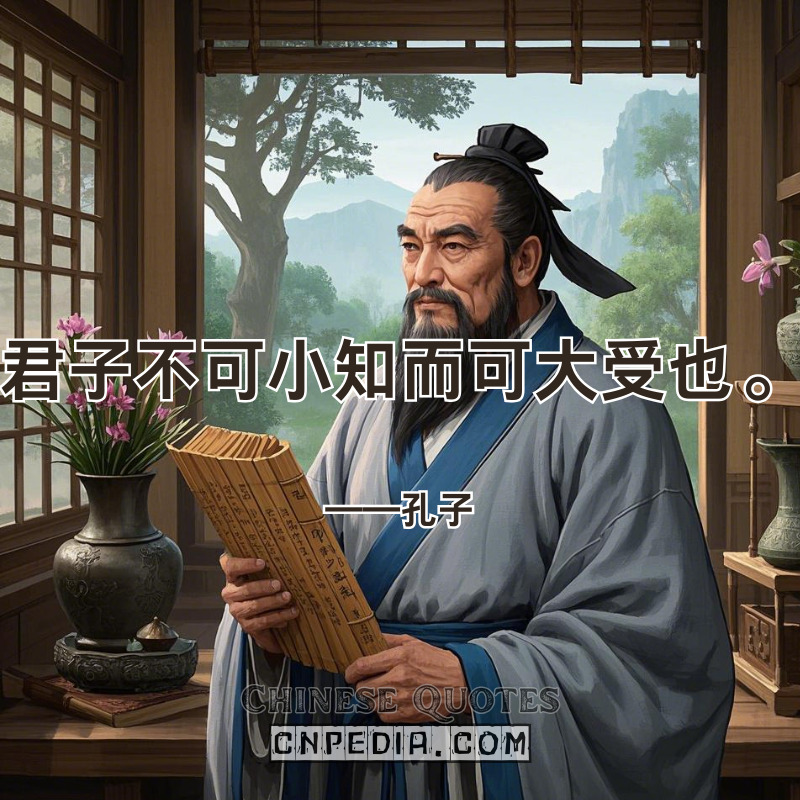
君子不可小知而可大受也。——孔子(jūn zǐ bù kě xiǎo zhī ér kě dà shòu yě — Kǒngzǐ) Translation: “Nobles can’t be measured in trifles but can bear great mandates.” Explanation: Confucius’ maxim 不可小知(bù kě xiǎo zhī) 而可大受(ér kě dà shòu) unveils a leadership paradox: true capability transcends micromanagement metrics. First, the character 受(shòu) (“to receive mandates”) structurally combines 爪(zhǎo) (“claw/hand”), 冖(mì) (“cover”), and 又(yòu) (“again”)—visually depicting a leader’s hand grasping authority through layered responsibilities. This ancient glyph encodes strategic patience—qualities modern algorithms often miss. Second, the “macro-micro paradox” reshapes CEO succession planning. Top firms like IBM now prioritize “strategic endurance” over quarterly KPIs, mirroring 大受(dà shòu)’s emphasis on crisis-caliber leadership. A 2023 Harvard study found CEOs selected for long-term vision outperformed short-term achievers by...
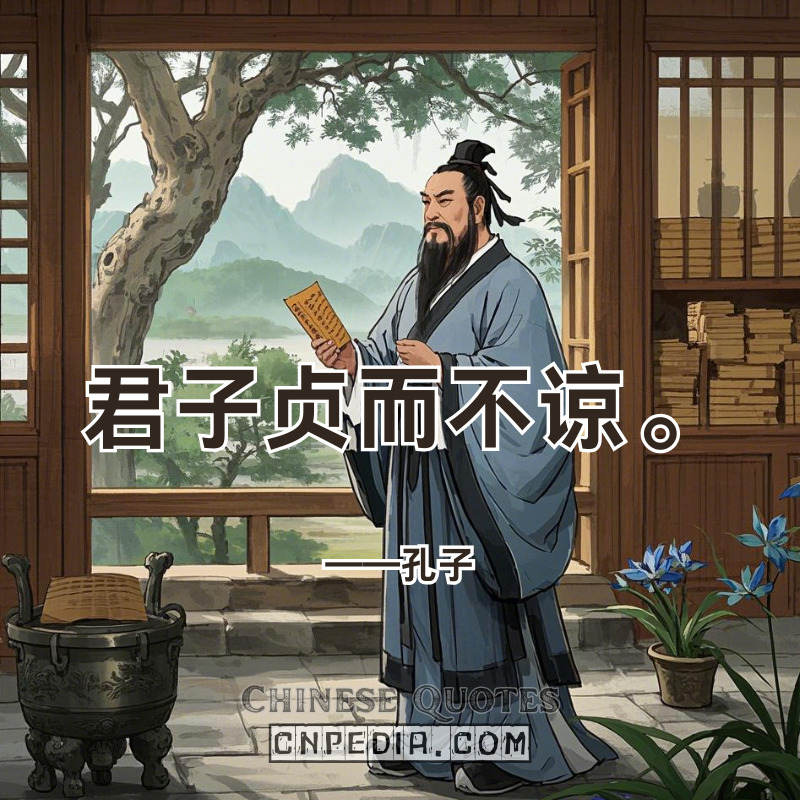
君子贞而不谅。——孔子(jūn zǐ zhēn ér bù liàng — Kǒngzǐ) Translation: “Nobles stay steadfast, not stubborn.” Explanation: Confucius’ maxim 贞(zhēn)而不谅(liàng) (“steadfast, not stubborn”) reimagines integrity as dynamic calibration. First, the character 贞(zhēn) combines 卜(bǔ) (“divination”) and 鼎(dǐng) (“ritual cauldron”), symbolizing a fusion of spiritual conviction and practical adaptability. Like ancient bronze vessels adjusting heat distribution during ceremonies, true nobility balances core principles with contextual responsiveness. Second, this “adaptive integrity” directly informs modern agile methodology. Scrum teams embody 贞(zhēn) by holding sprint goals steadfastly while embracing iterative feedback—mirroring the cauldron’s stable form adapting to variable contents. A 2022 MIT study found agile organizations with principle-driven flexibility outperformed rigid ones by 41% in crisis resilience. Third, the warning against 谅(liàng) (“inflexible stubbornness”) shapes crisis...

不患莫己知,求为可知也。——孔子(bú huàn mò jǐ zhī, qiú wéi kě zhī yě — Kǒngzǐ) Translation: “Fear not being unknown—strive to become worth knowing.” Explanation: Confucius’ axiom 不患(bú huàn)莫己知(mò jǐ zhī) (“fear not obscurity”) redefines meritocracy through proactive self-cultivation. First, the character 求(qiú) (“strive”) visually resembles radar beams scanning outward—its ancient structure (水 “water” + 一 “horizon” + 丶 “target”) symbolizing focused self-refinement rather than attention-seeking. This pre-Han dynasty insight anticipates modern personal branding’s core paradox: value creation precedes visibility. Second, the philosophy aligns with LinkedIn’s “Skills Endorsement” algorithms. Just as 求(qiú) emphasizes demonstrable competence over self-promotion, effective profile optimization requires letting measurable expertise (certifications, project metrics) organically attract opportunities—a digital-era echo of 为可知(wéi kě zhī) (“become worth knowing”). Third, the principle mirrors...

君子矜而不争,群而不党。——孔子(jūn zǐ jīn ér bù zhēng, qún ér bù dǎng — Kǒngzǐ) Translation: “Nobles maintain dignity without contention, belong without faction.”Explanation: Confucius’ maxim reveals a dual ethical paradox: 矜(jīn)而不争(zhēng) (dignity without confrontation) and 群(qún)而不党(dǎng) (community without faction). First, the character 矜(jīn) – combining 矛(máo) “spear” and 今(jīn) “now” – metaphorically arms noble conduct with present-moment moral vigilance. This structural wisdom predates modern conflict resolution theories by millennia. Second, the “social quantum state” principle operates through calibrated detachment. Like Wikipedia’s NPOV (Neutral Point of View) policy requiring editors to hold perspectives without enforcing them, Confucian dignity demands engagement without possessive attachment to outcomes. Third, the 不党(bù dǎng) (non-factionalism) ethic finds modern expression in DAO (Decentralized Autonomous Organization) governance models. Blockchain-based DAOs...